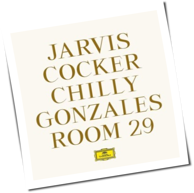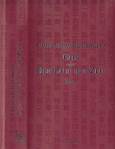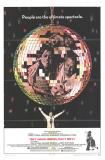(We Don't Need This) Fascist Groove Thang (II) : Mit Umberto Eco auf der Suche nach einem Begriff: Ur-Fascism / Fuzzy Totalitarianism
Vielen Dank für den Hinweis von @BBattmer auf Umberto Ecos essay "Ur-Fascism"at The New York Review of Books (June 22, 1995 Issue)
Der Essay könnte helfen, in der aktuell unübersichtlichen Lage zunächst Begriffsklärungen vorzunehmen, die präzisere Analyse ermöglichen.
Unter anderem wegen dieser Passage:
- Die anomische Herrschaft der Rackets und der verwilderte Leviathan (XXXIX): Alternative Fascism (?)
Der Essay könnte helfen, in der aktuell unübersichtlichen Lage zunächst Begriffsklärungen vorzunehmen, die präzisere Analyse ermöglichen.
This Fascist Groove Thang: Faschisten Alt Right Autoritaristen Populisten Reaktionäre Rassisten Nationalisten Rechtsradikale Nazis?
Open Culture: Umberto Eco Makes a List of the 14 Common Features of Fascism| November 22nd, 2016- One of the key questions facing both journalists and loyal oppositions these days is how do we stay honest as euphemisms and trivializations take over the discourse? Can we use words like “fascism,” for example, with fidelity to the meaning of that word in world history? ...
Eco grew up under Mussolini’s fascist regime, which “was certainly a dictatorship, but it was not totally totalitarian, not because of its mildness but rather because of the philosophical weakness of its ideology. Contrary to common opinion, fascism in Italy had no special philosophy.” It did, however, have style, “a way of dressing—far more influential, with its black shirts, than Armani, Benetton, or Versace would ever be.” The dark humor of the comment indicates a critical consensus about fascism. As a form of extreme nationalism, it ultimately takes on the contours of whatever national culture produces it. ...
While Eco is firm in claiming “There was only one Nazism,” he says, “the fascist game can be played in many forms, and the name of the game does not change.” Eco reduces the qualities of what he calls “Ur-Fascism, or Eternal Fascism” down to 14 “typical” features. “These features,” writes the novelist and semiotician, “cannot be organized into a system; many of them contradict each other, and are also typical of other kinds of despotism or fanaticism. But it is enough that one of them be present to allow fascism to coagulate around it.”
- - The cult of tradition. “One has only to look at the syllabus of every fascist movement to find the major traditionalist thinkers. The Nazi gnosis was nourished by traditionalist, syncretistic, occult elements.”
- The rejection of modernism. “The Enlightenment, the Age of Reason, is seen as the beginning of modern depravity. In this sense Ur-Fascism can be defined as irrationalism.”
- The cult of action for action’s sake. “Action being beautiful in itself, it must be taken before, or without, any previous reflection. Thinking is a form of emasculation.”
- Disagreement is treason. “The critical spirit makes distinctions, and to distinguish is a sign of modernism. In modern culture the scientific community praises disagreement as a way to improve knowledge.”
- Fear of difference. “The first appeal of a fascist or prematurely fascist movement is an appeal against the intruders. Thus Ur-Fascism is racist by definition.”
- Appeal to social frustration. “One of the most typical features of the historical fascism was the appeal to a frustrated middle class, a class suffering from an economic crisis or feelings of political humiliation, and frightened by the pressure of lower social groups.”
- The obsession with a plot. “The followers must feel besieged. The easiest way to solve the plot is the appeal to xenophobia.”
The enemy is both strong and weak. “By a continuous shifting of rhetorical focus, the enemies are at the same time too strong and too weak.”
- Pacifism is trafficking with the enemy. “For Ur-Fascism there is no struggle for life but, rather, life is lived for struggle.”
- Contempt for the weak. “Elitism is a typical aspect of any reactionary ideology.”
- Everybody is educated to become a hero. “In Ur-Fascist ideology, heroism is the norm. This cult of heroism is strictly linked with the cult of death.”
- Machismo and weaponry. “Machismo implies both disdain for women and intolerance and condemnation of nonstandard sexual habits, from chastity to homosexuality.”
- Selective populism. “There is in our future a TV or Internet populism, in which the emotional response of a selected group of citizens can be presented and accepted as the Voice of the People.”
- Ur-Fascism speaks Newspeak. “All the Nazi or Fascist schoolbooks made use of an impoverished vocabulary, and an elementary syntax, in order to limit the instruments for complex and critical reasoning.”
Unter anderem wegen dieser Passage:
- ... In 1942, at the age of ten, I received the First Provincial Award of Ludi Juveniles (a voluntary, compulsory competition for young Italian Fascists—that is, for every young Italian). I elaborated with rhetorical skill on the subject “Should we die for the glory of Mussolini and the immortal destiny of Italy?” My answer was positive. I was a smart boy.
I spent two of my early years among the SS, Fascists, Republicans, and partisans shooting at one another, and I learned how to dodge bullets. It was good exercise.
In April 1945, the partisans took over in Milan. Two days later they arrived in the small town where I was living at the time. It was a moment of joy. The main square was crowded with people singing and waving flags, calling in loud voices for Mimo, the partisan leader of that area. A former maresciallo of the Carabinieri, Mimo joined the supporters of General Badoglio, Mussolini’s successor, and lost a leg during one of the first clashes with Mussolini’s remaining forces. Mimo showed up on the balcony of the city hall, pale, leaning on his crutch, and with one hand tried to calm the crowd. I was waiting for his speech because my whole childhood had been marked by the great historic speeches of Mussolini, whose most significant passages we memorized in school. Silence. Mimo spoke in a hoarse voice, barely audible. He said: “Citizens, friends. After so many painful sacrifices … here we are. Glory to those who have fallen for freedom.” And that was it. He went back inside. The crowd yelled, the partisans raised their guns and fired festive volleys. We kids hurried to pick up the shells, precious items, but I had also learned that freedom of speech means freedom from rhetoric.
A few days later I saw the first American soldiers. They were African Americans. The first Yankee I met was a black man, Joseph, who introduced me to the marvels of Dick Tracy and Li’l Abner. His comic books were brightly colored and smelled good.
One of the officers (Major or Captain Muddy) was a guest in the villa of a family whose two daughters were my schoolmates. I met him in their garden where some ladies, surrounding Captain Muddy, talked in tentative French. Captain Muddy knew some French, too. My first image of American liberators was thus—after so many palefaces in black shirts—that of a cultivated black man in a yellow-green uniform saying: “Oui, merci beaucoup, Madame, moi aussi j’aime le champagne…” Unfortunately there was no champagne, but Captain Muddy gave me my first piece of Wrigley’s Spearmint and I started chewing all day long. At night I put my wad in a water glass, so it would be fresh for the next day.
In May we heard that the war was over. Peace gave me a curious sensation. I had been told that permanent warfare was the normal condition for a young Italian. In the following months I discovered that the Resistance was not only a local phenomenon but a European one. I learned new, exciting words like réseau, maquis, armée secrète, Rote Kapelle, Warsaw ghetto. I saw the first photographs of the Holocaust, thus understanding the meaning before knowing the word. I realized what we were liberated from...
View on YouTube
Zehn Uhr morgens
und mein Kopf ist zum Platzen,
als ob ich ein Faß Wein getrunken hätte
oder auf meinem Geburtstag gewesen wäre.
Ich öffne das Fenster; es ist noch dunkel.
Ich werfe einen Schrei in die Straße,
aber niemand antwortet.
Mein Herz ist zersprungen,
wie ein Spiegel zerspringt.
Die wunderschöne Uhr ist zersprungen –
erinnerst du dich, wie du sie nanntest?
Die Stille hält an, es ist mindestens Sieben.
Ich mache das Radio, den Fernseher an
und öffne die Ohren,
aber niemand sendet etwas.
Das Zimmer ist voller Tiere,
es scheinen Mücken zu sein;
so groß wie Hunde,
aber die können wenigstens nicht fliegen.
Vielleicht hört mich jemand,
ein alter Freund vielleicht.
Ich versuche, so laut wie möglich zu schreien,
so laut, daß vielleicht du mich hörst.
Welcher Tag, welches Jahr ist eigentlich?
Montag, Dienstag, was für ein Leben.
Aus einem Foto fängt meine Mutter an,
zu mir zu sprechen:
„Erinnerst du dich,
wie dein Vater überall zurechtkam?“
Es waren die Kriegsjahre,
alle am Boden zerstört,
man aß mit den Hunden.
Erinnerst du dich an den Jubel in Bologna
als die Amerikaner kamen?
1943 zogen die Leute ins Feld,
zogen ins Feld und starben und
wussten nicht, warum.
Aber nach zwei Jahren warteten
sie alle auf die Amerikaner;
auch die Faschisten,
wie heute in Riccione auf die Touristen.
Und du warst gerade in jener Nacht
auf dem Platz und schienst ein
König auf den Schultern deines Vaters.
Die Bombenangriffe waren vorbei,
und alle beglückwünschten sich.
Nur die Toten waren traurig
und ärgerten sich.
Nicht weil sie tot waren, sondern
weil sie morgen nicht aufwachen.
Erinnerst du dich an jene Dunkelhaarige?
Wie traurig sie war, weil sie wusste,
daß sie sie nicht sehen würde, die
Raketen auf dem Mond – dem Mond.
Raketen auf dem Mond sind völlig normal,
es gibt so viele.
In Reihen aufgestellt sehen sie aus wie
Weihnachtsbäume.
Wenn du dann das Fernrohr verrückst,
kannst du den Sternen einen Namen geben.
Du kannst mit allem spielen oder mit nichts,
auch mit deinem Leben.
Aber etwas fehlt uns, und dieses Etwas
macht uns überdrüssig.
Es verdrießt uns, all diese Dinge zu haben,
die uns fehlen, wenn wir sie nicht mehr haben.
Du begegnest überall Menschen,
die sich langweilen;
die Langeweile ist wie eine Verschwörung.
Dann fällt dir auf, wie sie alle in Eile leben –
vielleicht ist die Langeweile nur Angst,
eine Angst, die beleidigt,
die uns jeden Morgen überfällt;
die Angst, nur abgezähtes Fleisch zu sein,
und die Angst, daß das Leben,
edin Leben sich nicht mehr ändert.
Welches Jahr, welcher Tag ist eigentlich?
Montag, Dienstag – welch ein Leben!
Eine Zeitung fällt vom Himmel,
aber ohne jede Neuigkeit,
alles scheint normal zu sein.
Wer weiß, wie lange das noch so weiter
geht, wie lange sich die Erde dreht?
Vielleicht bleibt sie auch stehen...
Verzeihung, wo geht’s zum Krieg?
Biegen Sie da vorne ab...
Wir sehen uns morgen;
ich mache ein paar Sprünge im Wind,
wenn ich Lust habe.
Morgen komme ich hierher zurück, weil du
1983 da liegst wie ein Spiegel –
wir fühlen uns anders,
keiner weiß, warum.
Nicht besser, nicht schlechter,
aber alle, sogar die Trübseligsten,
erwarten wir zusammen aufzuwachen,
uns anzuschauen, uns zu berühren
und uns anzusehen,
als ob wir uns nie vorher gesehen hätten.
Und gerade du wirst heute Nacht auf dem
Platz auf niemandes Schultern ein König sein.
Keine Bombenangriffe.
- Die anomische Herrschaft der Rackets und der verwilderte Leviathan (XXXIX): Alternative Fascism (?)
gebattmer - 2017/01/22 19:34



























































Trackback URL:
https://gebattmer.twoday.net/stories/1022603871/modTrackback